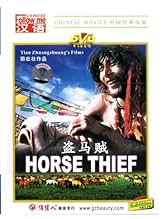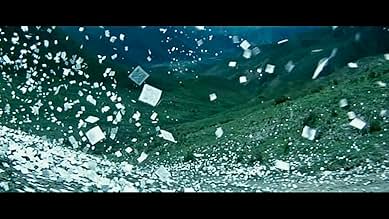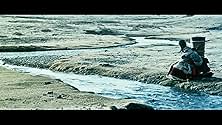IMDb-BEWERTUNG
6,8/10
1664
IHRE BEWERTUNG
Füge eine Handlung in deiner Sprache hinzuA Tibetan man struggles to provide for his family.A Tibetan man struggles to provide for his family.A Tibetan man struggles to provide for his family.
- Auszeichnungen
- 1 wins total
Empfohlene Bewertungen
A fascinating window into the world of Tibetan tribal life. Beautifully shot with stunning locations. The narrative is a little weak, but makes up for it visually.
One draw back is a few scenes of animal cruelty. These images are what stayed with me most and unfortunately let down the movie.
Set in 1923 against the breathtaking Tibetan landscape, The Horse Thief describes the retribution visited upon a clan member who is stealing horses. With minimal plot or dialogue, it is essentially a meditation on the Tibetan's struggle for survival in a harsh and uncompromising environment. The film dramatizes both the everyday occurrences and the religious rituals that are part of the fabric of Tibetan life.
The simple tale involves Norbu (Rigzin Tseshang), a member of a clan, who is accused of stealing horses and temple goods to support his wife Dolma (Jiji Dan) and their adored young son Tashi (Jamco Jayang). To keep the clan cleansed of evil, Norbu and his family are ostracized and banished to assume the life of wanderers. Norbu and his family leave the clan but do not renounce their faith. Appealing for divine intervention to keep them alive, the family engages in Buddhist rituals such as turning the prayer wheels, masked ceremonial dances, and prostration to Buddha.
Ultimately, their nomadic existence takes a grim personal toll. At the point of starvation, Norbu has to eat the newly fallen snow to give him strength, and is forced to resume stealing to save his family from the cold winter. The conclusion is stunning in its elemental power.
Though I was deeply moved by Tian's despairing vision and awed by the film's gorgeous cinematography, I found The Horse Thief to be quite demanding to watch. The film moves very slowly with long, static shots during which the camera remains fixed for several minutes. Also, being unfamiliar with Tibetan culture, I sought more explanation of the significance of some rituals, for example, the grazing of sacred sheep and the dances using ceremonial masks. I feel, however, that The Horse Thief transcends specific cultural limitations and achieves a universal quality in its depiction of the importance of faith and the strength of family.
I would have liked to have seen The Horse Thief in the theater, and hear it spoken in the original Tibetan language (it was dubbed into Mandarin). Nonetheless, I am grateful for having received this authentic insight into Tibetan culture, something that is uncommon in these days of Chinese occupation. Watching this film was almost a furtive experience, like stealing a glimpse into a beautiful and haunting secret world and rediscovering what it means to be human.
The simple tale involves Norbu (Rigzin Tseshang), a member of a clan, who is accused of stealing horses and temple goods to support his wife Dolma (Jiji Dan) and their adored young son Tashi (Jamco Jayang). To keep the clan cleansed of evil, Norbu and his family are ostracized and banished to assume the life of wanderers. Norbu and his family leave the clan but do not renounce their faith. Appealing for divine intervention to keep them alive, the family engages in Buddhist rituals such as turning the prayer wheels, masked ceremonial dances, and prostration to Buddha.
Ultimately, their nomadic existence takes a grim personal toll. At the point of starvation, Norbu has to eat the newly fallen snow to give him strength, and is forced to resume stealing to save his family from the cold winter. The conclusion is stunning in its elemental power.
Though I was deeply moved by Tian's despairing vision and awed by the film's gorgeous cinematography, I found The Horse Thief to be quite demanding to watch. The film moves very slowly with long, static shots during which the camera remains fixed for several minutes. Also, being unfamiliar with Tibetan culture, I sought more explanation of the significance of some rituals, for example, the grazing of sacred sheep and the dances using ceremonial masks. I feel, however, that The Horse Thief transcends specific cultural limitations and achieves a universal quality in its depiction of the importance of faith and the strength of family.
I would have liked to have seen The Horse Thief in the theater, and hear it spoken in the original Tibetan language (it was dubbed into Mandarin). Nonetheless, I am grateful for having received this authentic insight into Tibetan culture, something that is uncommon in these days of Chinese occupation. Watching this film was almost a furtive experience, like stealing a glimpse into a beautiful and haunting secret world and rediscovering what it means to be human.
After hearing Martin Scorsese declare Horse Thief as the #1 film of the 90s (actually released in 1987) when co-hosting the annual "Best of" show with Roger Ebert, I set out to see this film. Luckily, there was a copy available in the library. Unfortunately, the library would not allow me to take it home. So, I was stuck watching this film on a 10 inch screen television in a cramped cubicle with uncomfortable headphones crushing my ears. Obviously, this was not the way that Tian intended his film to be viewed.
Tian Zhuangzhuang's third feature, Horse Thief, is essentially dialogue-free and is rather slim on plot. The film is reminiscent of the silent-era when directors were capable of manipulating the camera to communicate their desired idea. Basically, the film centers on the banishment of Norbu (forcefully personified by Rigzin Tseshang in an astonishing debut), a local horse thief, and his wife and son. Norbu gives up stealing horses for his wife and sets out to find a more respectable profession. When times get rough, Norbu is confronted with the reality that he must steal again to save his family from the harsh, unforgiving winter.
Tian's film has a striking realistic quality to it that plays like a documentary. In one scene, we are given the chance to watch a ritualistic ceremony designed to please the mountain god. While this scene evokes awe, some scenes may be seen as quite offensive. For example, Norbu comes up behind an unsuspecting lamb and slits its throat. The viewer is forced to watch the animal writhe and thrash agonizingly struggling for its last breaths. This scene, although I cannot deny its accuracy and technical beauty, is distressing to watch. The reality of this scene is not achieved through use of mechanical animals and fake blood; it is achieved by the actual killing of a lamb for the production of this film. Aside from this painfully unpleasant section, Tian's cinematic mastery is thoroughly evident.
Because of the deficient viewing conditions, I was only able to catch a glimpse of Tian's overwhelmingly glorious cinematography: Norbu dolefully places his son's dead body in the middle of a snow-covered meadow for the gods to take. In deep focus, the camera slowly reveals Norbu's utter aloneness and emptiness. In this one shot, Tian has created cinematic perfection.
Tian Zhuangzhuang's third feature, Horse Thief, is essentially dialogue-free and is rather slim on plot. The film is reminiscent of the silent-era when directors were capable of manipulating the camera to communicate their desired idea. Basically, the film centers on the banishment of Norbu (forcefully personified by Rigzin Tseshang in an astonishing debut), a local horse thief, and his wife and son. Norbu gives up stealing horses for his wife and sets out to find a more respectable profession. When times get rough, Norbu is confronted with the reality that he must steal again to save his family from the harsh, unforgiving winter.
Tian's film has a striking realistic quality to it that plays like a documentary. In one scene, we are given the chance to watch a ritualistic ceremony designed to please the mountain god. While this scene evokes awe, some scenes may be seen as quite offensive. For example, Norbu comes up behind an unsuspecting lamb and slits its throat. The viewer is forced to watch the animal writhe and thrash agonizingly struggling for its last breaths. This scene, although I cannot deny its accuracy and technical beauty, is distressing to watch. The reality of this scene is not achieved through use of mechanical animals and fake blood; it is achieved by the actual killing of a lamb for the production of this film. Aside from this painfully unpleasant section, Tian's cinematic mastery is thoroughly evident.
Because of the deficient viewing conditions, I was only able to catch a glimpse of Tian's overwhelmingly glorious cinematography: Norbu dolefully places his son's dead body in the middle of a snow-covered meadow for the gods to take. In deep focus, the camera slowly reveals Norbu's utter aloneness and emptiness. In this one shot, Tian has created cinematic perfection.
Big screen is the only place to see this masterpiece. As the last of the films viewed @ the Detroit Institute of Arts Detroit Film Theatre's Monday Night Series, Horse Thief was fitting to be viewed last: truly the best was saved till last.
A Detroit Free Press reviewer gave the film only 2 stars because of a "sorely needed script". The beauty of this film is exactly that lack of dialogue which leaves room to enjoy the visual feast that the director intended.
I am grateful that the film was allowed out of China at all and privileged to view the beauty of Tibetan culture and Buddhist monk rituals, the inside of a Tibetan temple with rows and rows of flickering candles, the tortured beauty of the mountainous region in summer, spring and winter and the painful, poignant and ultimately tragic tale of a man, his wife and children and their lives in a region of the world that some Americans might only see in the pages of National Geographic.
A Detroit Free Press reviewer gave the film only 2 stars because of a "sorely needed script". The beauty of this film is exactly that lack of dialogue which leaves room to enjoy the visual feast that the director intended.
I am grateful that the film was allowed out of China at all and privileged to view the beauty of Tibetan culture and Buddhist monk rituals, the inside of a Tibetan temple with rows and rows of flickering candles, the tortured beauty of the mountainous region in summer, spring and winter and the painful, poignant and ultimately tragic tale of a man, his wife and children and their lives in a region of the world that some Americans might only see in the pages of National Geographic.
I'm not Martin Scorsese, I'm not a film student, I'm just a guy who likes movies. I saw this film tonight and found myself a little mystified over all the praise. I'm also not the Summer Blockbuster guy either so that's not my justification for not gushing about this film.
I will remember the primitiveness and brutality of life in Tibet. I will remember the colorful and confusing religious rituals. I'm sure they'd say the same thing about Catholicism. The landscape is beautiful, but that kind of sells itself. Why does the director take credit for that?
As stated on other reviews there are several scenes of sheep abuse which are less than politically correct. OK yeah, I get it, it's a different culture. Doesn't make it easier to watch.
Working with a group of non-actors is a major hurdle to overcome and I salute Tian for overcoming this.
I kept thinking it a bit odd that Norbu's wife had no idea what he did for a living. I also found it a bit odd that she had no recrimination for him after getting banished. Further more I'd have thought she'd really see red when their son dies, probably as a result of their standard of living after being banished. Perhaps this is a cultural difference. I understand the director is making a political statement in this film, but ultimately it seems fairly universal, not a product of Chinese society specifically.
To sum up the dubbing was awful, the sound quality in general was very poor, character development was fairly minimal and the one scene of violence (people on people) was not very convincing. I'm sure I would need to go to film school to find out why this film was called the best of the decade, but if you need that much education to appreciate something is it really worth it in the end?
I will remember the primitiveness and brutality of life in Tibet. I will remember the colorful and confusing religious rituals. I'm sure they'd say the same thing about Catholicism. The landscape is beautiful, but that kind of sells itself. Why does the director take credit for that?
As stated on other reviews there are several scenes of sheep abuse which are less than politically correct. OK yeah, I get it, it's a different culture. Doesn't make it easier to watch.
Working with a group of non-actors is a major hurdle to overcome and I salute Tian for overcoming this.
I kept thinking it a bit odd that Norbu's wife had no idea what he did for a living. I also found it a bit odd that she had no recrimination for him after getting banished. Further more I'd have thought she'd really see red when their son dies, probably as a result of their standard of living after being banished. Perhaps this is a cultural difference. I understand the director is making a political statement in this film, but ultimately it seems fairly universal, not a product of Chinese society specifically.
To sum up the dubbing was awful, the sound quality in general was very poor, character development was fairly minimal and the one scene of violence (people on people) was not very convincing. I'm sure I would need to go to film school to find out why this film was called the best of the decade, but if you need that much education to appreciate something is it really worth it in the end?
Wusstest du schon
- WissenswertesNumber 1 on Martin Scorsese's top 10 movies of the 90s list, which he presented on a special episode of At the Movies with Roger Ebert. Even though the movie was made and released in the 80s, it gain traction in the US during the 90s.
- VerbindungenFeatured in Siskel & Ebert & the Movies: Best of the '90s (2000)
Top-Auswahl
Melde dich zum Bewerten an und greife auf die Watchlist für personalisierte Empfehlungen zu.
- How long is The Horse Thief?Powered by Alexa
Details
- Erscheinungsdatum
- Herkunftsland
- Offizieller Standort
- Sprachen
- Auch bekannt als
- The Horse Thief
- Drehorte
- Produktionsfirma
- Weitere beteiligte Unternehmen bei IMDbPro anzeigen
Zu dieser Seite beitragen
Bearbeitung vorschlagen oder fehlenden Inhalt hinzufügen



















